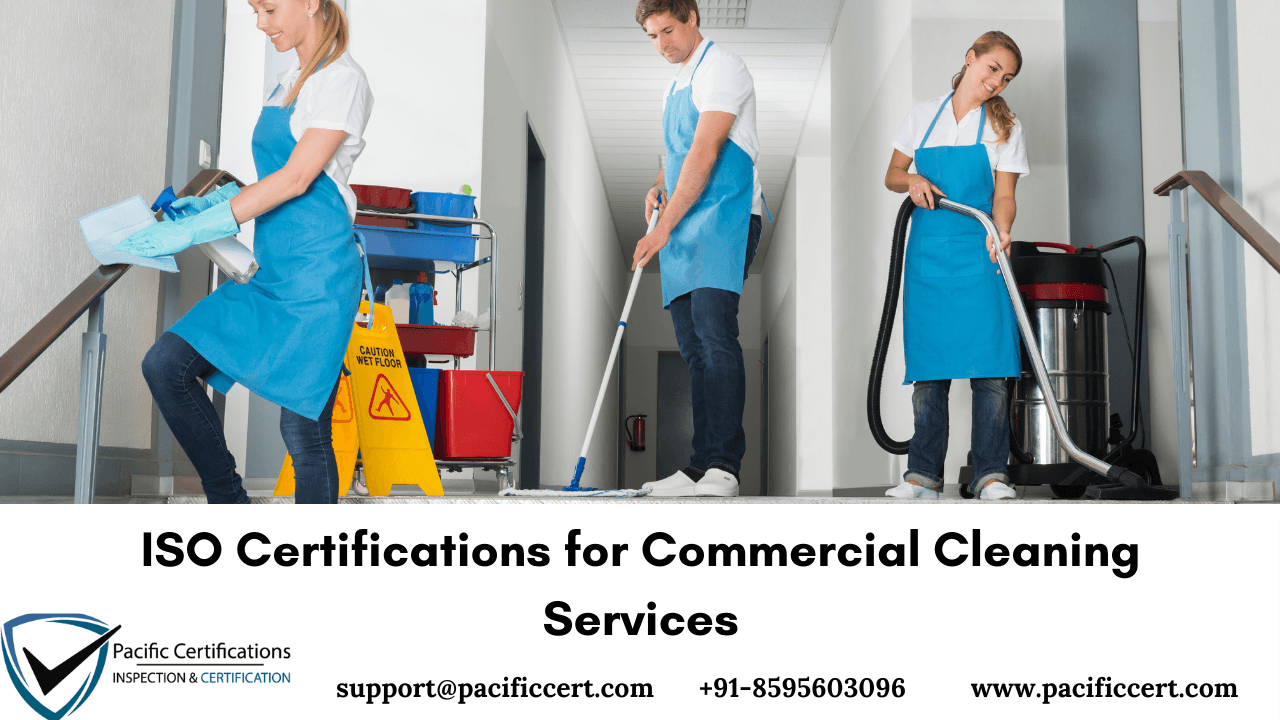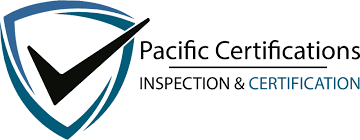ISO Certifications for Commercial Cleaning Services, Requirements and Benefits

Introduction
Commercial cleaning services are essential across industries, from offices and schools to hospitals, factories, and retail spaces. This sector ensures hygienic and efficient workplaces that meet rising public health and regulatory expectations. The global commercial cleaning services market is projected to surpass USD 500 billion, supported by demand in healthcare, hospitality, and corporate facilities.
Businesses in this sector face challenges such as occupational safety risks, environmental concerns linked to chemicals, and client expectations for consistent quality. ISO certifications provide cleaning companies structured systems for safety, reliability, and sustainability, helping them deliver trusted services.
Clean environments aren’t maintained by chance — they’re achieved through systems that ensure consistency, safety, and client confidence.
For more details on how we can assist your organization in obtaining ISO certifications, contact [email protected]
Quick Summary
ISO certifications help commercial cleaning businesses deliver reliable, safe, and eco-friendly services. The key standards are ISO 9001 (quality), ISO 45001 (safety), and ISO 14001 (environment). Certification reduces risks, supports compliance, and builds trust with clients in healthcare, corporate, and public sectors.
Applicable ISO standards to Commercial Cleaning Services
Below are the key ISO standards applicable to commercial cleaning services:
ISO 9001: Quality Management Systems (QMS)
ISO 9001 is the most widely recognized quality management system standard across all industries, including commercial cleaning. It provides a framework for companies to ensure that their services consistently meet customer and regulatory requirements, and it emphasizes continual improvement.
ISO 14001:2015 Environmental Management System (EMS)
ISO 14001 is an environmental management standard that helps businesses reduce their environmental impact. Given the environmental impact of cleaning products, chemicals, and waste, this standard is highly relevant for commercial cleaning companies.
ISO 45001: Occupational Health and Safety Management System (OHSMS)
ISO 45001 is the global standard for occupational health and safety (OHS) management. It helps businesses provide a safe working environment by identifying and mitigating workplace hazards. This is particularly important in the cleaning industry, where workers are exposed to physical and chemical risks.
ISO 27001: Information Security Management System (ISMS)
Commercial cleaning businesses that handle sensitive client data, such as access codes, security information, and personal details, need to protect that information. ISO/IEC 27001 provides a framework for managing information security risks and ensuring data protection.
ISO 22000: Food Safety Management System (FSMS)
If a cleaning company serves clients in the food industry or provides services like kitchen cleaning, ISO 22000 helps ensure food safety throughout the cleaning process, minimizing the risk of contamination and adhering to relevant regulatory requirements.
ISO 41001: Facility Management System (FMS)
ISO 41001 provides a framework for effective facility management, which is integral to commercial cleaning services. This standard helps companies optimize their cleaning schedules and maintain high standards of cleanliness in various facilities.
ISO 10002: Customer Satisfaction and Complaints Handling
ISO 10002 focuses on managing customer satisfaction and handling complaints effectively. For commercial cleaning companies, customer service is crucial, and this standard provides a structured approach to resolving client issues and improving service quality.
Click here to find out more applicable standards to your industry
Implementing these ISO standards can open doors to new business opportunities for Commercial Cleaning Services. For assistance with ISO certifications, contact [email protected].
What are the requirements of ISO Certifications of Commercial Cleaning Services?
Each ISO certification comes with specific requirements that organizations must meet. These requirements are designed to ensure the highest levels of quality and customer satisfaction. Below are the generic & specific requirements of each key ISO standard for commercial cleaning services:
Generic requirements:
Define the scope of services (office, industrial, healthcare, hospitality, etc.).
Set policies on quality, safety, environmental care, and customer service.
Carry out risk assessments for chemical use, staff safety, and service reliability.
Document cleaning protocols, safety rules, waste disposal, and reporting methods.
Train staff in hygiene, chemical handling, protective equipment, and customer service.
Keep inspection logs, training records, audits, and corrective action reports.
Monitor KPIs such as complaint levels, service delivery rates, accidents, and energy use.
Run regular internal audits and reviews to check system effectiveness.
Specific requirements:
ISO 9001 Requirements
Documented Quality Management System (QMS): Develop and implement a QMS that outlines the company’s processes, procedures, and responsibilities.
Customer Focus: Demonstrate a commitment to meeting customer requirements and enhancing customer satisfaction.
Process Approach: Apply a process-based approach to manage and control activities that contribute to product or service quality.
Risk-Based Thinking: Identify potential risks and opportunities related to service quality, and take appropriate actions to address them.
Continuous Improvement: Regularly monitor and review processes to improve efficiency and quality.
ISO 14001 Requirements
Environmental Policy: Establish and maintain an environmental policy that reflects the organization’s commitment to environmental management.
Environmental Impact Assessment: Identify and assess environmental impacts related to the use of chemicals, water, energy, and waste management.
Legal Compliance: Ensure compliance with relevant environmental regulations and laws.
Environmental Objectives: Set measurable environmental objectives and targets for improvement.
Employee Training: Provide employees with training on sustainable practices and how to reduce the environmental impact of cleaning activities.
ISO 45001 Requirements
Hazard Identification and Risk Assessment: Identify workplace hazards such as exposure to harmful chemicals, ergonomic risks, and physical hazards, and conduct a thorough risk assessment.
Health and Safety Policy: Develop and communicate a health and safety policy that prioritizes employee well-being.
Incident Reporting and Investigation: Implement systems for reporting and investigating workplace accidents, near-misses, and hazards.
Compliance with Safety Regulations: Ensure compliance with occupational health and safety laws.
Safety Training: Provide regular training to employees on safe work practices, proper use of personal protective equipment (PPE), and emergency response.
ISO/IEC 27001 Requirements
Risk Assessment and Treatment: Identify information security risks and implement appropriate measures to mitigate these risks.
Access Control: Establish controls to limit access to sensitive information, ensuring that only authorized personnel can access client data.
Incident Management: Develop procedures for responding to and managing security incidents or data breaches.
Information Security Policies: Implement and maintain security policies that govern the protection of sensitive data.
Compliance with Data Protection Laws: Ensure that the company complies with relevant data protection regulations, such as GDPR.
Tip: Companies should start with ISO 9001 for service quality and ISO 45001 for worker safety, then add ISO 14001 to meet growing demand for green cleaning practices.
Contact us at [email protected] for more information!
What are the benefits of ISO Certifications for Commercial Cleaning Services?
ISO certifications offer significant benefits for commercial cleaning businesses by helping them to meet regulatory requirements and improve overall efficiency. Here are the key advantages:
ISO standards like ISO 9001 ensure that cleaning companies deliver high-quality services that meet customer expectations and improve customer satisfaction.
ISO 14001 certification demonstrates a commitment to environmental stewardship by reducing the environmental impact of cleaning activities.
ISO 45001 helps companies implement effective health and safety management systems, reducing workplace accidents.
ISO/IEC 27001 ensures that sensitive customer information.
ISO 10002 allows companies to manage customer complaints effectively, leading to improved client relationships.
ISO certifications provide companies to stand out in competitive bidding processes.
By achieving ISO certifications, companies ensure compliance with local and international regulations.
The commercial cleaning industry is evolving toward sustainability and digital monitoring. Allied Market Research forecasts steady global expansion, with the eco-friendly cleaning segment growing over 8% annually through 2030. Technology-driven cleaning methods — including automated scrubbers, IoT-enabled sensors, and AI-based facility management — are rapidly being adopted. Clients are increasingly demanding transparency and ISO-based documentation of service delivery, incident handling, and chemical safety.
Furthermore, environmental regulations are tightening, especially in the EU and North America, pushing companies to adopt ISO 14001 and ISO 50001 for energy and resource optimization. Health and safety certification under ISO 45001 has also become a key client requirement, particularly for contractors working in hospitals, airports, and manufacturing plants where compliance standards are stringent.
How Pacific Certifications can help?
Pacific Certifications, accredited by ABIS, provides auditing and certification services for ISO standards that matter to the cleaning sector. We work with businesses to establish internationally recognized systems for safety, quality, and sustainability.
With Pacific Certifications, you can:
Achieve certification for ISO 9001, ISO 14001, ISO 45001, ISO 41001, and more.
Build client trust with accredited certification.
Improve compliance with regulations and tender requirements.
Strengthen long-term business opportunities in corporate, healthcare, and public sectors.
Contact Us
If you need support with ISO certification for Commercial Cleaning business, contact us at [email protected] or +91-8595603096.
Author: Sony
Read More at: Blogs by Pacific Certifications

